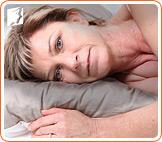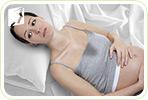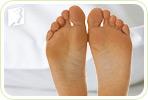
Heavy night sweats (known as nocturnal hyperhidrosis) describe night sweats during menopause, which are strong enough to affect women during sleep. They are usually caused by fluctuating estrogen levels, which a woman experiences during menopause.
During menopause, estrogen levels oscillate, causing the hypothalamus (responsible for regulating body temperature) to incorrectly perceive an abnormally high body temperature and raise a false alarm in an attempt to cool the body. Heavy night sweats affect a large number of menopausal women, causing the unpleasant experience of waking up sweat-drenched, cold, and anxious.
Other Causes of Heavy Night Sweats
While shifting hormone levels are responsible for many menopausal night sweats, other factors can also contribute to or trigger heavy night sweats.
Insufficient amounts of sleep. 7-8 hours per night are recommended for most people.
Sedentary lifestyle. Inactive women are much more likely to experience night sweats (and more intense menopause symptoms overall) than their more active counterparts.
-

Warm environment. Lowering bedroom temperature may help alleviate overheating and night sweat episodes.
Hot tubs or saunas. These may aid relaxation, but they raise the body's temperature significantly and can exacerbate night sweats
A vitamin-deficient diet. Vitamins B, C, and D, and calcium are all important parts of a balanced diet, and their deficiency can impair temperature regulation.
Medications or underlying medical conditions. Certain medications and conditions can cause night sweats. Talk to your doctor if you are concerned.
While the cause of heavy night sweats during menopause is due primarily to hormonal imbalance, it is possible to make lifestyle changes that can decrease the intensity of these episodes. It is also a good idea to talk to your doctor if you are concerned because certain medications can effectively reduce night sweats.
Can Heavy Night Sweats Be Eliminated?
There are ways a woman can effectively reduce night sweats. Exercising regularly, avoiding spicy, and acidic foods, and sleeping in a cool area will all help to minimize the occurrence and severity of your night sweat episodes.

Stress is another common cause of heavy night sweats, causing heart rate to rise, and body temperature to increase. Many women may find it useful to practice relaxation techniques, such as paced breathing exercises, yoga, and tai chi to ease their night sweats.
Hormone replacement therapy (HRT) is also one of the most effective treatments when it comes to treating night sweats and other menopausal symptoms such as hot flashes, mood swings, and vaginal dryness. HRT works by increasing the amount of estrogen in a woman's body. Talk to your doctor for more information.
Sources
- National Health Service. (2014). Night Sweats. Retrieved November 10, 2015, from http://www.nhs.uk/conditions/night-sweats/Pages/Introduction.aspx
- Mayo Clinic Staff. (2014). Night Sweats. Retrieved November 10, 2015, from http://www.mayoclinic.org/symptoms/night-sweats/basics/definition/sym-20050768


